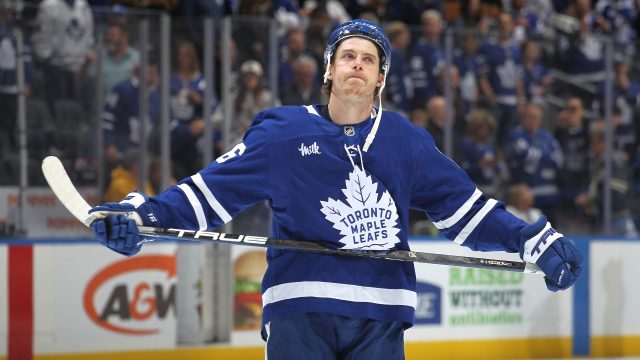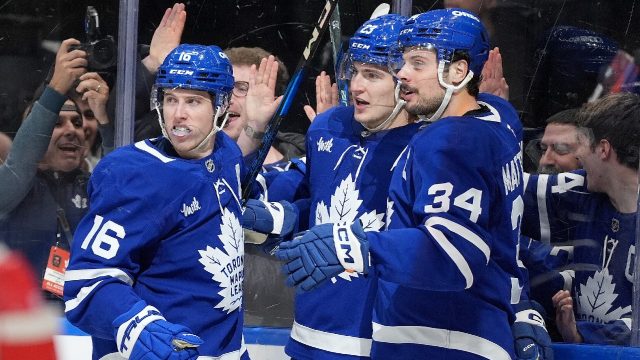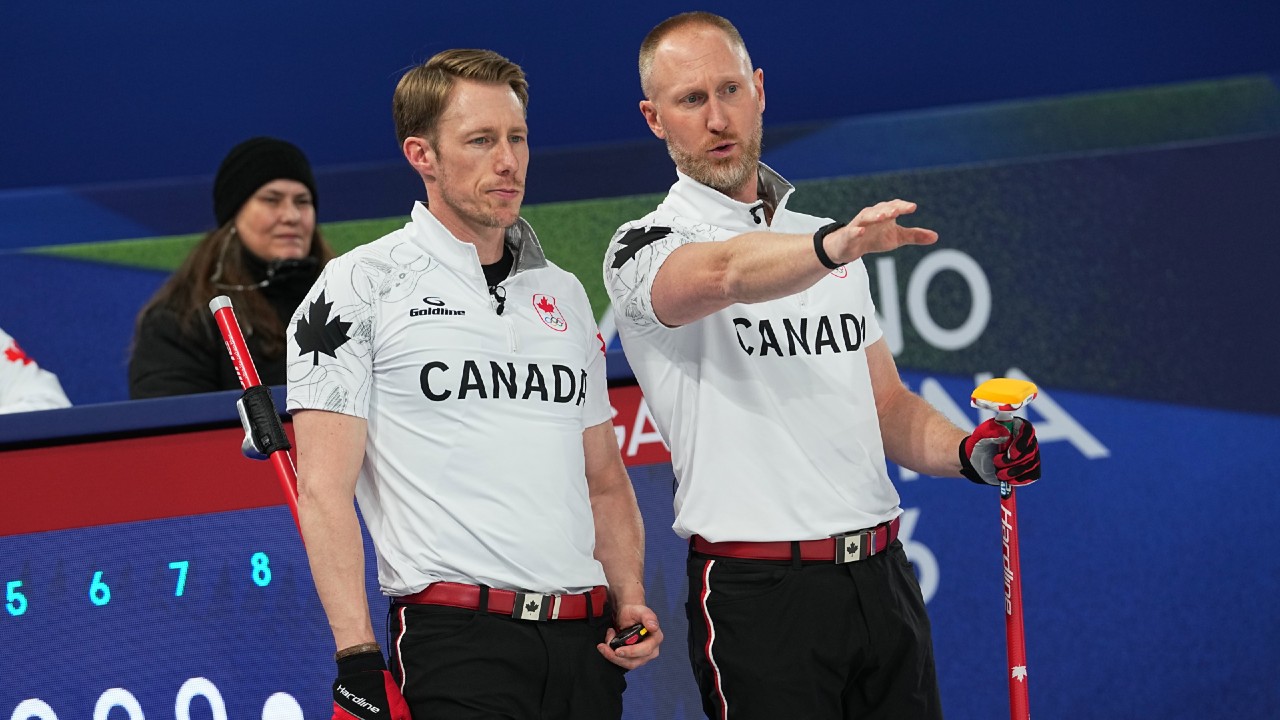
In the end, the Toronto Maple Leafs‘ Core Four era fell apart like a Temu purchase, the picture of something great just digitally rendered, its plastic parts snapping with pressure applied.
At least it was definitive.
No prominent injury kept them a few goals light of success. No weak goaltending let down a team of destiny. No bad calls or bounces, no “hair’s breadth margin against the defending champs” as a crutch. No almosts, no ifs, no buts or maybes within squinting distance.
Buh-bye.
You can read Luke Fox’s terrific piece on this being the definitive end here, so I won’t belabour that specific point further. He’s right. If the same four ingredients continue to bake a failed cake, changing the candles won’t improve the next one.
The problem now is, it’s not entirely clear which central ingredients they should shop for, and more challenging is the question of which ones are even available.
How do you strip your team of a prime-aged 100-point Selke nominee and get better?
This has been the theme of the text message conversations I’ve had with people I consider to have a good pulse on the Leafs. This looming what now?
-
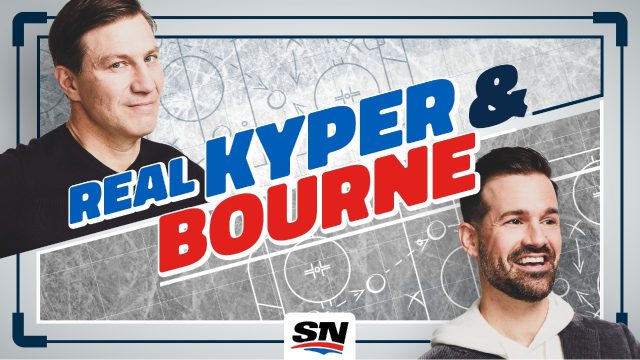
-
Real Kyper and Bourne
Nick Kypreos and Justin Bourne talk all things hockey with some of the biggest names in the game. Watch live every weekday on Sportsnet and Sportsnet+ — or listen live on Sportsnet 590 The FAN — from 4 p.m. to 6 p.m. ET.
Player-wise, the only thing changing for sure is that Mitch Marner is going to play somewhere else. He may well get himself a Stanley Cup someday, a la Phil Kessel in Pittsburgh, but it’s all too clear he can’t be a central driver of team success in the playoffs, at least not in Toronto.
Maybe in a market with less pressure, he’ll be able to go forward more, to not default to slinking laterally and flipping pucks into the neutral zone. Maybe a new situation frees him of the fear of taking chances.
But even if that happens, it won’t be on the Leafs for moving on from him, it will have been on the player. It won’t be “How did the Leafs not see this playoff success coming?” It will have been “Why couldn’t he do this when he was there?”
In that sense, it’s a pretty low-stress decision.
Yet still, they’re likely to be worse off without him, at least in the regular season. The hope is they can improve their under-pressure performances because you don’t walk through the fires of hell to win a Cup without your feet getting hot.
So here’s what the Leafs are looking at, in this what-now conversation:
They’ve got Auston Matthews, William Nylander, Matthew Knies (who needs a new deal as an RFA), and a colossal amount of cap space. That with a defence corps that’s extremely good at limiting chances (all under contract for two more seasons), and two goalies who have proven themselves to be very good. They had some struggles in the playoffs but not enough to give up on them.
The Leafs are going to be at least “good” next year, yet again. That’s baseline.
Yes, the D could use some improvement offensively, and we’ll get to that. There are other changes I’d like to see up front. But heading into next year they’ve got the building blocks of a playoff team in place.
The free agent options out there don’t provide a plug-and-play replacement for Marner, though the Leafs likely don’t want it to. The idea is now to spread around the money a bit more so that, maybe, they get Anton Lundell and Eetu Luostarinen-type contributions from a third line when their comparable Matthew Tkachuk goes quiet.
As the Leafs thirst to both plug the Marner hole and get more “playoff built,” it’s easy to see them follow the breadcrumbs to Sam Bennett. Let it be known that I recognize his talent, his value, his ability. If the Leafs could have him next season alone I’d say pay him $10 million for that.
But on July 1, Bennett will be 29 years old, and looking for a seven-year contract. He just hit 50 points for the first time in his career, which is his offensive ceiling. The 4 Nations Face-Off and Stanley Cup runs have his notoriety at an all-time premium, and you best believe you’re going to be paying for that name brand. Circumstances are just begging the Leafs to sign what could easily become a regrettable contract.
Yes, the salary cap will be going up, but you can’t do the franchise equivalent of a suddenly-rich athlete blowing their money on cars with butterfly doors (maybe some sort of raised truck is a better metaphor here). You’re going to need that money eventually, and you’d like to pay for what a player is expected to bring, not their previous accomplishments.
Not many physical players continue their level of physicality into their older years, so in a couple of years if he’s 20 per cent less physical and scoring 38 points (roughly his career average), that contract is going to look like a problem.
Nik Ehlers is a possibility and he might be a tempting acquisition, provided it leaves a good financial delta between him and what Marner would’ve earned for them to spend on more support. Muscle is good, but you don’t want to become talent-light, and this team already doesn’t pass the puck overly well. Lose Marner, and you’re looking at a whole lotta one-man shows out there. Ehlers can at least play connector, as you saw on the Winnipeg Jets’ series-saving goal against the St. Louis Blues.
Having cap space in-season is also a weapon as things become available, as the Toronto Raptors once did with Kawhi Leonard. Just this past year, Mikko Rantanen became available, and while the Leafs don’t have a ton of picks for that kind of acquisition, if a big name is suddenly an option in season you’ve gotta believe they’d find a way. At worst, having that space as they approach the deadline and teams fall out of contention would leave them flexible.
This leads us to the question of John Tavares. This one is a tough call, as he poured in goals this season, but was hot and cold in the playoffs. He won draws and battles galore, finished with five goals (one behind Nylander’s team-leading six), and has done himself proud as a Maple Leaf. The problem is still the previous cake analogy. He’s been a part of the mix that leads to a failed dessert. If you’re able to get the ingredients at a discount, does it matter?
The elephant in the room is Morgan Rielly. He scored them some goals and had some flashes in the playoffs, but at the end of the day, he’s their most concerning defensive defenceman. His hesitance in Game 7 rivalled that of Marner, and while the forwards always catch the brunt of the blame with this team, it’s worth considering: would you rather have Rielly in your lineup, or the $7.5 million in cap space?
The latter — the cap space — was far more valuable even just last season, when everything was tighter. As the cap shoots up, the number may not look so bad. But if Rielly’s not on your top pair, it’s tough to see where he fits. Paired with Brandon Carlo, he can be OK, and if you did move on, it’s not clear how you solve the lack of offence from the back end by moving off your best offensive defenceman (even if that’s a bit like being the fastest sloth).
Those are the most pressing issues they’ve got to sort out before they can get to questions like: What do you do with the glut of forwards who don’t contribute but get paid well? David Kampf makes $2.4 million for two more seasons and was a scratch all playoffs. Calle Jarnkrok makes $2.1 million to be an NPC in a game set on medium difficulty. The second-most penalized NHL player through two rounds had six minor penalties, while Max Domi had nine, registering 11 penalties total. He had an OT winner, which on a team lacking big-moment players probably keeps him safe, but there were long stretches where he looked like he might be the next healthy scratch (and that goal probably kept him in). He makes $3.75 million, and will make that next year, the one after, and the one after that. He’s 30 and scored eight times in 74 games this year.
-
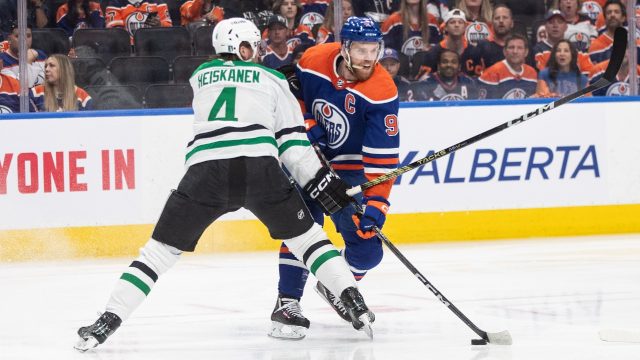
-
Watch the Stanley Cup Playoffs on Sportsnet
The NHL’s best are battling for the right to hoist the Stanley Cup. Watch every game of the Stanley Cup Playoffs on Sportsnet and Sportsnet+.
In the end, we spent so much time talking about “Are the Maple Leafs different?” that it’s a relief to know that, at long last, they will be. Questions will remain, including those of their captain, Auston Matthews. But he will be back, and he’ll have a chance to give those answers. So will Craig Berube, and William Nylander, and many of the same pieces that won the Atlantic Division and went seven in Round 2.
Ultimately, the Core Four era was fun but fell flat. They got great players who were young, immature, and prideful, who, instead of seeing one another as mutual load-bearing pillars building some great cathedral of success, fought to be the steeple, visible and above the whole.
The answer to what now starts with those days being done. Whether it’s because they make a change at president, or because the head coach has had a season to soak it all in, or the captain learns some lessons, or because Brad Treliving makes roster changes, it doesn’t matter. There are plenty of ways to push their recent past into the deep distance.
What does matter is that next year the question won’t be “Are they different?” It will be evaluating “Are they better?” and, more importantly, will they be better when the pressure is on.


